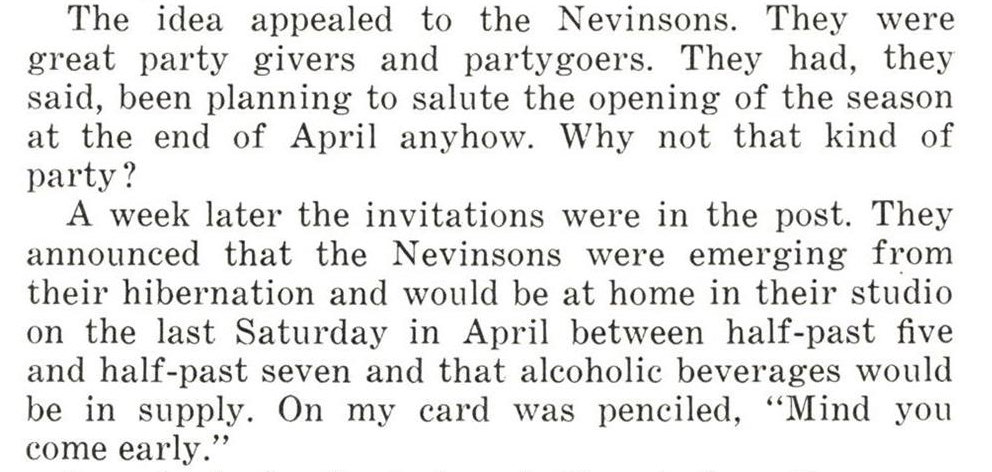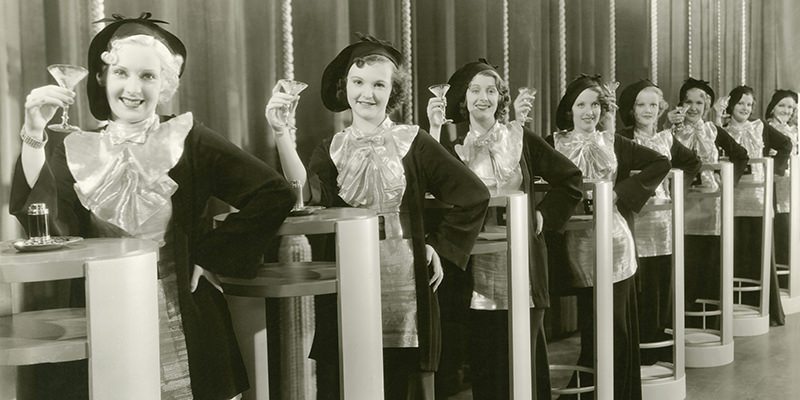England might have gotten a few things wrong recently. Or right? Or wrong. Anyway, the British have absolutely gotten a bunch of shit right in the long run. (Aggressive empire-building not included.) Among said gems: Monty Python, the contagious ebullience of Twiggy, Ab-Fab, and the cocktail hour.
If you’ve ever read Brideshead Revisited (or seen it, and by Hogwarts, does Jeremy Irons look lovely in this film), you’ll know that Evelyn Waugh took a certain relish in writing about the fact, and fantasy, and fortitude, of inebriation. As much as the book was about family and faith, it was about friendship. Beautifully intoxicated friendship.
So then it should come as no surprise (or should, if you’ve just woken up in a fountain—see above clip) that his brother Alec basically invented—by deceit—the cocktail party.
Tricking people into drinking is never a good—or legal—idea. But as Waugh explained in an essay in Esquire magazine, “There was nothing to do on winter evenings between half-past five and half-past seven.” Granted, if you think long and hard enough, you’ll remember stuff like “taking care of a child or pet,” “gardening” (English people love gardening), “reading a book,” etc. But Waugh didn’t just mean an activity to consume hours until sleep or supper was appropriate. He meant something to do. A socially unfettered writer tends to seek out pleasures beyond his front pasture, except Waugh couldn’t find any that tempted him.
Naturally, as a writer, he simply thought up a solution. As he writes in his article, “’What one needs…is some kind of party that starts at half-past five, that last ninety minutes, at which alcohol is served but not much food.’” Believe it or not, such a thing was not common in England in the 1920s. Americans may have been roaring it up with Champagne and awesome hats, but, per Waugh, by 5 pm, England was steeped in tea and not much else.
Waugh’s first attempt at stirring it up, British style, was fairly straightforward. After some intense, hypothetically intoxicated, discussion with painter C. R. W. Nevinson and his wife, Waugh decided to hold a cocktail party. It failed. It failed despite the “large earthenware jug” of rum and gin on both ends of the table. Only one person showed up, as the concept had zero traction in British society, and most of the rest of the entire world.

Not that Waugh didn’t have a good time. Or high hopes. His drink—“Jamaican rum had been blended with Rose’s lime juice and sharpened with Angostura”—was a delight. “It also sent a glow along my veins. ‘This,’ I said, ‘is going to be a party.’” Alas, it was anything but. Even his painter friend had his doubts. “’You haven’t convinced us that what London needs is an alcoholic party at half-past five.’”
If that were enough to stop Waugh, none of us would be saying “it’s 5 o’clock somewhere” at 2 pm. Waugh was writing a book, Kept, and kept wishing his characters could meet over drinks. (The basic concept, still in play in watering holes the world over: drinks fuel amorousness.)
“I returned to the attack in the Autumn of 1925,” he writes. Except here, as he notes, he proceeded “with caution.” Caution being lies. “I asked some thirty people to tea at five o’clock.” As expected, “they came to find the conventional appurtenances of a tea…Then, at a quarter to six, I produced my surprise—a beaker of Daiquiris.”
Here’s where an American—an Embassy worker—stepped in to genesis of the cocktail hour; a friend of Waugh’s, he actually mixed the Daiquiris, which tasted more of “sherbet,” leading guests to drink and ask for more. Except, whoops, “very soon it became apparent that the drink was singularly strong.”
The cocktail hour, or rather surprise-teatime-Daiquiri-blitz, was a success. A known, and desirable, female writer did not make a dinner date (Waugh’s goals for the cocktail party were slightly less than noble, mostly involving getting attractive women comfortably onto couches) and everyone was generally intrigued, as British people often are about pretty much everything. “’You served cocktails after tea?…What was the point of that?’” Inquiry preceded imitation and the cocktail party was born. A book tour later, Waugh returned home to a nation wherein cocktails had replaced tea after the five o’clock hour.
Not that his fellow author and brother approved, however artfully he wrote of raiding a woefully neglected (and ridiculously well stocked) wine cellar. “Some years ago I remarked to my brother Evelyn that I believed I had invented the cocktail party,” Alec writes. “His eyes widened and whitened in the way they did. ‘I should be careful about making that boast in print.’”
“He may well be right,” writes Waugh. “But I have, I trust, reason for maintaining that in the literary bohemian circle I did frequent in London, I gave the first cocktail party.”
On behalf of everyone who gets a bit thirsty for more than tea at 5 o’clock, Cheers, Alec.

